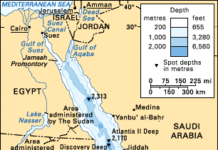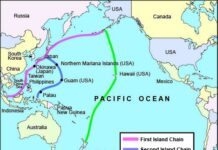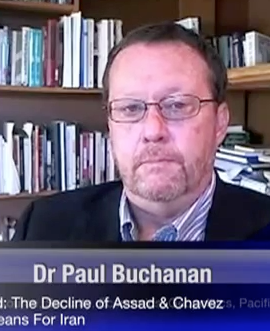Pacific Scoop PIF Coverage
Oxfam calls for ‘big picture’ climate change funding in Pacific
Rua

Tawaa Tebunang, 46, at Tanikabaai Village, Tabontebike, Abaiang, in Kiribati. This land was inundated with water following a king tide in 2004. Many crops
were lost as a result including pawpaw, pandanus, banana, taro and figs amongst others; the soil is now too saline to grow food. Image: Rodney Dekker/Oxfam Australia
A NEW report on the way climate change funding is managed in the Pacific is calling for a coordinated and “inclusive” approach in fighting the multiple threats of climate change. A special Pacific Scoop backgrounder.
Pacific Scoop:
Report – By Cassandra Mason
Oxfam has proposed a strategic “big picture” approach to regional coordinated funding for Pacific climate change in a new report launched at the Pacific Islands Forum today with the issue being a “core item” on the agenda.
The report, Owning Adaptation in the Pacific: Strengthening governance of climate adaptation finance, gives a detailed look at how climate finance is being managed in Papua New Guinea, Tonga and Vanuatu and makes recommendations for improvements – and also across the Pacific.
Funded by the British High Commission and launched by Oxfam and Richard Benyon, Parliamentary Under-Secretary for Natural Environment and Fisheries in DEFRA, the report acknowledges good work that is already being undertaken by governments, donors and civil society.
 But it also demands a more inclusive partnership in the face of what Oxfam New Zealand’s executive director Barry Coates calls a “plethora of uncoordinated initiatives”.
But it also demands a more inclusive partnership in the face of what Oxfam New Zealand’s executive director Barry Coates calls a “plethora of uncoordinated initiatives”.
He says Oxfam’s motivation in conducting the research has not been to simply produce a report, but to bring about real change.
Lead researcher Nic Maclellan says climate change finance is one of the core items on the agenda for the forum.
“Pacific governments have been talking about this issue for years,” he says.
Central pillar
“Climate finance is one of the central pillars of the global negotiations at Copenhagen and onwards.”
Although developed countries have pledged US$100 billion every year until 2020 to offset the adverse effects of climate change, climate finance shortcomings have meant that many Pacific governments simply cannot absorb and more of the money, says Maclellan.
“One of the core concerns from the Pacific is that in spite of pledges there are obstacles preventing the resources getting to the people who need them the most.”
Through workshops with government, civil society like women’s groups and farmers and interviews, the researchers found that while Pacific nations were affected in different ways, common problems arose despite their diversity.
One of these was the recurring theme that “not enough resources are getting to the people at the grassroots level,” says Maclellan.
The report says accessibility must be improved if climate finance is to be used effectively.

The new Oxfam report for a strategic regional initiative on climate change launched at the Pacific Islands Forum today.
‘More inclusive’
Barry Coates says the report is the first of its kind in terms of research across civil society and other groups, and “far more inclusive and societal” than standard government approaches.
“What happened in the old days is lots of money went into government and didn’t necessarily appear to others in society as having achieved much.
“So the report talks about ‘how do we make this into much more of an inclusive partnership?’
“Here’s something that’s not just a government challenge, it’s a challenge of communities and everyone else in society.”
While climate change finance in the Pacific has traditionally suffered from a “plethora of uncoordinated initiatives”, Coates says it is time to move away from a more project-based approach towards a coordinated bigger picture.
“There’s always been a willingness but not a close understanding of how [climate change finance management] could be achieved.”
Coates says the report points out good practices and gives encouragement to things that are “starting off in the right direction”.
New approaches
It also emphasises the importance of talking to donors to make sure they are supportive of new approaches rather than undermining them.
He says the openness of the governments has been “great”, with Oxfam experiencing a universal willingness in all three countries.
Yet Coates says the challenges are “pretty huge”.
One major challenge of wide capacity-building is setting up programmes that are sufficiently broad but not so complex that they are inaccessible to large sections of society, he says.
“The challenge is to give people at the community level the ability to be able to understand and respond.”
Another challenge is the urgency, he says.
“All the signs are saying that the impacts on the Pacific and other parts of the world are happening faster than anyone had imagined.
Urgent priority
“Recent climate science is pointing out the degree to which adaptation is not a future agenda, adaptation is a vital and urgent priority now and will become a lot worse sooner than we thought.”
Yet Coates says adaptation shouldn’t take the heat off the countries responsible for making global commitments to reduce their emissions – including New Zealand.
“There’s only so much you can do in terms of adaptation when you’re looking at sea level rises of several metres.”
“Countries will not exist.”
![]() Oxfam’s report hasn’t been alone in its push for attention around climate change finance at this year’s Pacific Islands Forum.
Oxfam’s report hasn’t been alone in its push for attention around climate change finance at this year’s Pacific Islands Forum.
The Forum Secretariat issued a statement last week highlighting the complexity of the issue and calling on Forum Island Countries to build capacity
The Secretariat’s director of strategic partnerships and coordination, Su’a Kevin Thomsen, told a PIF media workshop on climate change finance “Climate change financing and our countries’ ability to access and utilise effectively is a critical part of our countries’ ability to effectively respond to climate change.
Cashing in
“It is not about cashing in on an opportunity to make a new buck, but rather, ensuring that our countries have adequate resources to help them adapt to a very serious, unpredictable and long term challenge.”
The British High Commission also expressed concerns.
High Commissioner Vicki Treadell says the Pacific Island states need to be recognised as “especially vulnerable” to the effects of climate change.
“The effect on fish stock, the effect on rising water levels, the effect on extreme climatic conditions that can lead to coastal erosion, flooding and storm patterns.
“This is a very serious agenda for a part of the world that will be in the front line of damage.”
And that is why the management of the funding is so important, she says.
“Accessing these funds is the first challenge. The money is there but, how to get it? How to then translate it into delivery and execution?”
European impact
Treadell hopes that the report would ultimately have an impact on the EU, the second largest donor in the Pacific.
“We will be playing our part, not just as Britain but as part of the European Union.
“We would hope to inform and influence what the European Union does in the Pacific.”
She says the High Commission chose to support Oxfam because of its independence and objective approach.
“It is something that we funded ourselves because we thought it would be useful for all donor partners if someone did an independent piece of work,” she says.
Coates agrees the partnership with the High Commission has worked well.
“They have been very generous.
“They haven’t influenced the report and the content and we’re grateful for that.”
In terms of the report’s global implications, Coates says: “A far greater understanding that good accountability for climate finance is in everyone’s interests.
“There are a lot of good things happening as a result of this and I think this kind of approach can really help transform some of the relationships of government and civil society around the use of climate finance.”
Cassandra Mason is a Postgraduate Diploma in Communication Studies student journalist on the Asia-Pacific Journalism course at AUT University.
This item is republished courtesy of Pacific.Scoop.co.nz.
Unless expressly stated otherwise, the findings, interpretations and conclusions expressed in this media release item do not necessarily represent the views of 36th Parallel Assessments.













